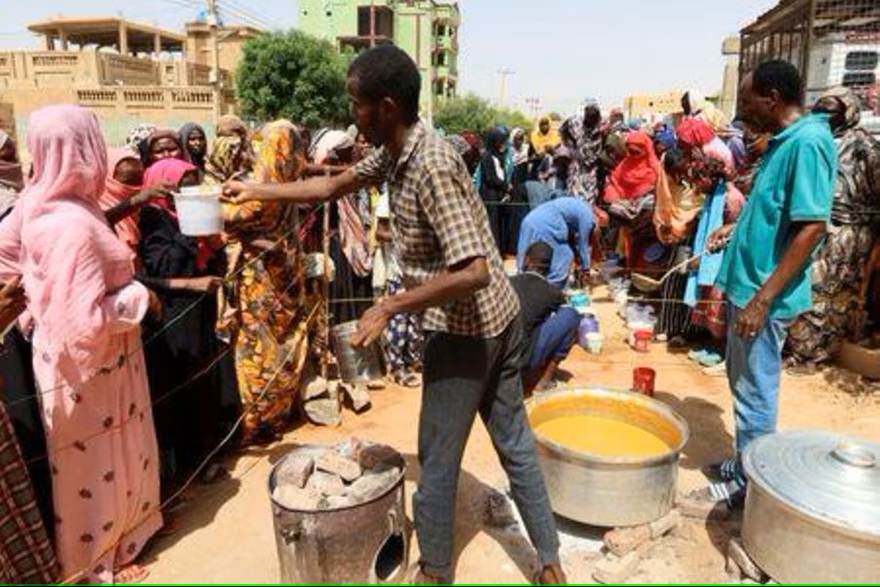Khartoum –The forces of freedom and change called on warring parties in Sudan to end the war and urgently fulfill their pledges in the Jeddah platform, warning of the repercussions of the crisis, which is entering its eleventh month in the country.

It reminded the Sudanese army and the Rapid Support Forces of their obligations related to the delivery of humanitarian aid, the opening of safe corridors for relief, the full protection of workers and institutions working in humanitarian work and facilitating their entry into the country and their access to all areas.
At a time when the crisis of cutting off communication and Internet services is worsening in most parts of the country, whose repercussions have reached the administrative capital Port Sudan, causing paralysis in the movement of transactions, health services, administrative and banking procedures, as well as obfuscating the humanitarian situation and the consequences of the escalating war between the army and the Rapid Support.
Since the outbreak of war between the Sudanese army and the Rapid Support Forces in mid-April, the telecommunications and internet sector has been witnessing a wide decline, culminating last Monday when the country witnessed a complete service outage.
Three major companies operate Sudan’s telecommunications sector, including Sudani, the primary operator of Sudatel, which provides telecommunications services in the country, as well as Kuwait’s Zain and South Africa’s MTN.
Most of the telecom companies’ service exchanges are based in the capital, Khartoum, where fighting has been escalating for nearly a decade.
Sudan’s Telecommunications and Post Regulatory Authority said the RSF had shut down work at Sudani and MTN’s data centres, accusing them of sabotage and further increasing the suffering of citizens.
He pointed out that the Rapid Support demands the restoration of communications to the areas under its control in the Darfur states in exchange for the restoration of service to other parts of the country.
The Telecommunications and Post Regulatory Authority attributed the service shutdown in the Darfur region to the burning of several towers, vandalism of fibers, power cuts and lack of fuel.
It accused the RSF of forcing Zain Telecom technicians to stop service in River Nile and Port Sudan states and threatening to stop them completely.
In this context, the Forces of Freedom and Change stressed the need to oblige the two sides of the fighting to pledge to ensure the continuity of telecommunications and Internet services throughout Sudan and not to expose them to deliberate interruption or any deliberate actions or interventions that have a negative impact on the efficiency and quality of their services and consider any infringement on them as a war crime.
it denounced the partial or complete interruption of Internet services inside Sudan and the transformation of this vital service as one of the tools of war between the two parties, pointing to the direct damage that resulted from it, and its consequences on citizens and the general life in conflict areas, in addition to the presence of direct effects and threats on the health and food security of those inside Sudan whose lives and livelihood are linked to banking applications linked to communication networks and the Internet.
In addition to the escalating communications crisis, warnings of the consequences of the humanitarian crisis in the country continue. The United Nations has warned that the expansion of fighting in Sudan – including Gezira State, the country’s food basket – has led to one of the world’s largest displacement and protection crises, while hunger is rampant, with nearly 18 million people facing acute food insecurity.
Heavy fighting continues to damage water supply networks and other vital civilian infrastructure in Sudan, where nearly three-quarters of health facilities are out of service in conflict-affected states.
Diseases such as cholera, measles and malaria are spreading at a time when two-thirds of the population lacks health care and child mortality from malnutrition is increasing. Some 19 million children are out of school, and human rights violations are widespread, with reports of gender-based violence persisting.
The Office for the Coordination of Humanitarian Affairs (OCHA) and UNHCR warned in a joint statement on Thursday that half of Sudan’s population, an estimated 25 million people, were in need of humanitarian assistance and protection.
More than 1.5 million people have fled across Sudan’s borders to the Central African Republic, Chad, Egypt, Ethiopia and South Sudan.
The Forces for Freedom and Change (FFC), the ruling coalition before last October’s coup, has intensified the catastrophic effects of the continuation of the war in Sudan, civilians facing the specter of famine and reports of increased child mortality due to lack of food.
it pointed out that these reports sound the alarm as Sudan, which is the world’s food basket, faces the dangers of food insecurity, while the specter of famine threatens its people and their children die from hunger and lack of food.
noted in a statement on Saturday that the country is facing a defining moment that requires both sides of the war to reflect on the outcome and results of the war, which it described as “absurd” and to reach the conviction that its continuation means more destruction and destruction that is completely unjustified.


